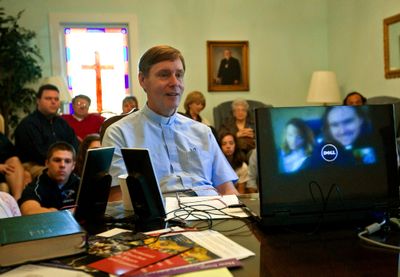Global understanding
Internet telephone links churches around world

RALEIGH, N.C. – In many churches, there is no greater honor than meeting a missionary who is working in the jungles, slums and sore spots of the world to spread the faith on behalf of those more attached to the comforts of home.
But for most Christians, such interactions are rare. Mostly the good works of these missionaries surface in the pages of the church bulletin or in a denominational magazine.
At St. Philip Lutheran here, such interactions have become regular Sunday fare over the past few weeks, thanks to modern technology.
Using software that allows users to make video telephone calls over the Internet, a Sunday school class at St. Philip was able to hear, see and talk to missionaries stationed as close as Costa Rica and as far away as Zambia.
It began when church member Heidi Pongracz approached her pastor, the Rev. Dave Amidon, to ask how she could make the church more aware of the work her brother was doing as a Lutheran missionary to Zambia.
Amidon, the co-pastor of St. Philip, told her he regularly communicates with his daughter living in Paris through Skype, the Internet telephone service. He wondered if the church might set up a call with Pongracz’s brother.
Before long, a Sunday school curriculum was developed hooking up St. Philip members with five countries where Lutherans work on behalf of the 5 million-member denomination, the Evangelical Lutheran Church in America.
The experience helped church members learn about other countries and the role faith plays in such settings. It also made members proud of their own denomination.
“It was a humbling experience learning about what the church does,” Pongracz said. “People are doing some incredible work to help other people. They’re rising above very difficult circumstances, and they show honor to God and the church.”
At a time when technology and travel are bringing the world closer together, the Sunday school class at St. Philip provided another opportunity for members to grow in their global understanding.
At 9:30 a.m. each Sunday the class met in the church parlor, where the pastor took a seat at a table with a laptop plugged into a set of speakers and a projector.
On a wall, a white screen was set up to magnify the laptop image. A few keyboard strokes and several dial tones later, Amidon established a connection.
The technology didn’t always work perfectly. In some countries – Costa Rica and Zambia – there was a noticeable audio or visual delay.
In others – France, where Amidon’s daughter lives, and Denmark, where one of the church’s members is the pastor of an international English-speaking church – the connection hummed along flawlessly.
And in one country – Haiti – church members made do with a DVD recording, supplied in advance by the brother-in-law of a church member.
Amidon e-mailed each of the missionaries a set of questions to help prepare them for the session: What is your work like? What are you trying to accomplish?
Church members jumped in with plenty of their own.
During the last session, a hookup with the Rev. Chad Rimmer, pastor of the International Church of Copenhagen, some high school students joined the conversation.
“Being aware of other cultures, other ways of thinking, and realizing one is not superior to the other enables you to reach out as equals,” Amidon said. “Once you grasp that idea, it’s pretty neat.”